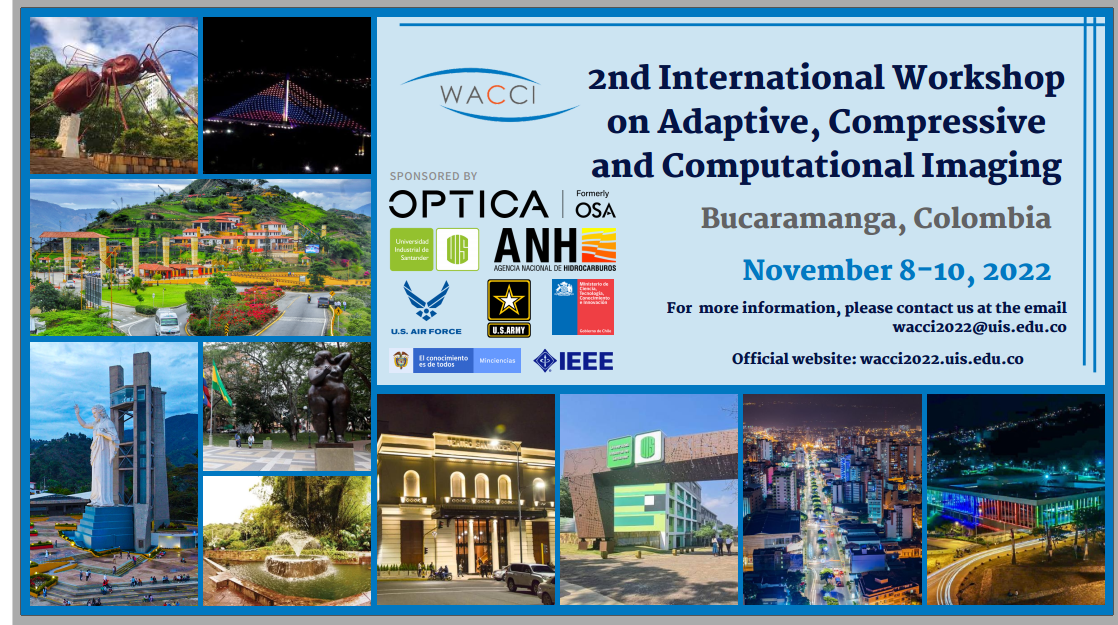2nd International Workshop on Adaptive, Compressive and Computational Imaging
http://wacci2022.uis.edu.co/home.html

The 2nd International Workshop on Adaptive, Compressive and Computational Imaging WACCI 2022 covers the most recent and exciting advances in state-of-the-art computational imaging topics, with plenary speakers, and special sessions. In addition, several matchmaking events targeting students and professionals will be featured in WACCI 2022.
Date and Time
Location
Hosts
Registration
-
 Add Event to Calendar
Add Event to Calendar
- Contact Event Host
- Co-sponsored by Optica --- Agencia Nacional de Hidrocarburos
- Survey: Fill out the survey
Speakers
David Brady of Duke University
Super Cameras
Professor Brady's research focuses on "smart cameras" which use artificial intelligence to increase the amount of visual information captured and to render this information useful. In 2012 his group built the world's first gigapixel camera, his work today focuses on making gigapixel media and interactive virtual reality broadcasting ubiquitous.
Biography:
David J. Brady (Fellow, IEEE) received the graduation degree from Macalester College, St Paul, MN, USA, and Caltech, Pasadena, CA, USA. He is currently the J.W. and H.M. Goodman Chair of optical sciences with the University of Arizona, Tucson, AZ, USA. He was a Professor of electrical and computer engineering with Duke University, Durham, NC, USA, and Duke Kunshan University, Suzhou, China. He was on the Faculty of the University of Illinois, Champaign, IL, USA. He is the author of Optical Imaging and Spectroscopy. His research interests include array cameras and compressive tomography. He is a Fellow of OSA and SPIE. He won the 2013 SPIE Dennis Gabor Award for work on compressive holography.
Email:
Brendt Wohlberg of Los Alamos National Laboratory
Coil: Coordinate-based internal learning for tomographic imaging
This work propose Coordinate-based Internal Learning (CoIL) as a new deep-learning (DL) methodology for continuous representation of measurements. Unlike traditional DL methods that learn a mapping from the measurements to the desired image, CoIL trains a multilayer perceptron (MLP) to encode the complete measurement field by mapping the coordinates of the measurements to their responses. CoIL is a self-supervised method that requires no training examples besides the measurements of the test object itself. Once the MLP is trained, CoIL generates new measurements that can be used within most image reconstruction methods.
Biography:
Brendt Wohlberg (Senior Member, IEEE) received the B.Sc. degree (Hons.) in applied mathematics, the M.Sc. degree in applied science, and the Ph.D. degree in electrical engineering from the University of Cape Town, Cape Town, South Africa, in 1990, 1993, and 1996, respectively.,He is currently a Staff Scientist with the Theoretical Division, Los Alamos National Laboratory, Los Alamos, NM, USA. His primary research interests are in signal and image processing inverse problems and computational imaging.,Dr. Wohlberg was a co-recipient of the 2020 SIAM Activity Group on Imaging Science Best Paper Prize. He was the Chair of the Computational Imaging Special Interest Group (now the Computational Imaging Technical Committee) of the IEEE Signal Processing Society from 2015 to 2017. He was an Associate Editor of the IEEE Transactions on Image Processing from 2010 to 2014 and the IEEE Transactions on Computational Imaging from 2015 to 2017. He is also an Associate Editor of the SIAM Journal on Imaging Sciences and the Editor-in-Chief of the IEEE Transactions on Computational Imaging.
Email:
Media
| Flyer_WACCI | 1.74 MiB | |
| PTTX_WACCI | 6.30 MiB |

